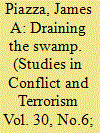|
|
|
Sort Order |
|
|
|
Items / Page
|
|
|
|
|
|
|
| Srl | Item |
| 1 |
ID:
076950


|
|
|
|
|
| Publication |
2007.
|
| Summary/Abstract |
This study empirically evaluates the question of whether or not the promotion of democracy in the Middle East will reduce terrorism, both in terms of terrorist attacks sustained by Middle Eastern countries and in terms of attacks perpetrated by terrorist groups based in Middle Eastern countries. Using a series of pooled, time-series negative binomial statistical regression models on 19 countries from 1972 to 2003 the analysis demonstrates that the more politically liberal Middle Eastern states - measured both in terms of democratic processes and in terms of civil liberties protections - are actually more prone to terrorist activity than are Middle Eastern dictatorships. The study demonstrates, furthermore, that an even more significant predictor of Middle Eastern terrorist attacks is the intensity of state failures, or episodes of severe political instability that limit central government projection of domestic authority, suffered by states in the region. States that are unable to respond to fundamental challenges to political stability posed by internal political strife, ethnic conflict or the phenomenon of "stateless areas," geographic or political spaces within states that eschew central government authority, are significantly more likely to host or sustain attacks from terrorist groups. The findings have implications for current United States antiterrorism policy toward the Middle East and provide a statistical/empirical foundation to previous studies on the relationship between terrorism and state failure.
|
|
|
|
|
|
|
|
|
|
|
|
|
|
|
|
| 2 |
ID:
076952


|
|
|
|
|
| Publication |
2007.
|
| Summary/Abstract |
This study explains Israel's insufficiently discriminate use of strategic assassinations during the last two decades. It shows that the tool's misuse considerably diminished its overall contribution to Israel's national security. It identifies five dimensions of systematic misuse: timing, political views of the targets, organizational affiliation, domestic political consequences for the adversary, and the visibility of Israel's responsibility. It finds three clusters of causes for these patterns of misuse: a flawed decision-making culture, the prevalence of false causal stories, and the pernicious effect of norms. This study could not find evidence for a direct link between domestic political pressures to any systematic pattern of misuse
|
|
|
|
|
|
|
|
|
|
|
|
|
|
|
|
| 3 |
ID:
076949


|
|
|
|
|
| Publication |
2007.
|
| Summary/Abstract |
Prior literature on women's participation in terrorism has paradoxically interpreted this involvement as a sign of women's newfound empowerment, and as an indication of ongoing gender oppression. The study examines the hypothesis that Palestinian women's involvement in terrorism indicates women's liberation. The data are derived from in-depth interviews with fourteen women who were detained or incarcerated in Israeli prisons for security offenses. The interviews shed light on the women's pathways to terrorism, the roles that they play in terrorist activity, and the aftermath of their security offenses within Palestinian society and culture. The study underlines the "no return" option and "no win" situation that Palestinian women who embark on terrorist activities encounter. The results demonstrate that although some women became involved in terrorism due to the sense of liberation that it provided, the women largely became disempowered in the aftermath of their offenses; rather than receiving praise for their activism as they had expected, they were shunned by others for their violation of gender expectations, and failure to fulfill traditional gender roles. The social and personal costs of involvement in terrorism for Palestinian women are analyzed, and policy implications of the findings for theory and practice are discussed
|
|
|
|
|
|
|
|
|
|
|
|
|
|
|
|
| 4 |
ID:
076948


|
|
|
|
|
| Publication |
2007.
|
| Summary/Abstract |
This article argues that a major factor in terrorist acts is an appeal to the actor's own community at an emotional and symbolic level, through acts of sacrifice, particularly self-sacrifice. Although other aims also exist, a prime concern is to recall the actor's home audience to the struggle, because the actor regards himself as acting on their behalf. This utilizes the imagery and symbolism of traditional religion, implying a strong communal and non-material impetus to terrorist acts, rather than rational material calculation, that modern Western man finds difficult to comprehend. It also recalls much classical social theory, which emphasized the central role of religion in community. Self-sacrifice tells an emotional story to the actor's community that is comprehensible to them and will have an emotional appeal to maintaining the community. For the Northern Ireland hunger strikes (possibly analogous to suicide bombers) this is reflected in their appeal solely to a Catholic/nationalist community that equates strongly with ideas of a pre-modern society under threat from a modernizing society. All the hunger strikers were very normal for their community, but left non-Catholics completely unmoved. Consequently there is a need to understand the communal dynamics behind terrorism if one is to effectively counter the threat and that different societies may have different values regarding the individual, community, and life itself. Individual motivations do not provide an adequate explanation for much terrorism and it is a failure to grasp this that severely hinders much counterterrorism
|
|
|
|
|
|
|
|
|
|
|
|
|
|
|
|
| 5 |
ID:
076951


|
|
|
|
|
| Publication |
2007.
|
| Summary/Abstract |
The strategic and economic importance of the Straits of Malacca makes it one of the world's major sea routes most vulnerable to a terrorist attack. The piracy problem that continues to frustrate maritime authorities in the Straits bears proof to this and, given the heightened security concerns post-9/11, has alarmed the waterway's major users. Although international pressure has forced the littoral states - Singapore, Malaysia, and Indonesia - to up their efforts on improving Straits security, national interests and a reluctance to address the problem as a potential terror threat continues to hinder cooperation. This article attempts to look at how three neighbors in the same Straits came to have such divergent policies on combating maritime terrorism.
|
|
|
|
|
|
|
|
|
|
|
|
|
|
|
|
|
|
|
|
|